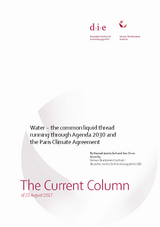The Current Column
Water – the “blue” thread running through the 2030 Agenda and the Paris Climate Agreement
Janetschek, Hannah / Ines DombrowskyThe Current Column (2017)
Bonn: German Development Institute / Deutsches Institut für Entwicklungspolitik (DIE) (The Current Column of 28 August 2017)
Water is essential to humankind and the environment. It also plays a fundamental role in climate change adaptation and, as a cross-cutting theme, offers significant potential for implementing the 2030 Agenda on a cross-sectoral basis. At the annual World Water Week in Stockholm, experts from the worlds of research, policy-making and civil society address the pressing issue of water and water resources. The aim is to raise awareness of the topic among policy-makers, society and industry and to mainstream the water sector to a greater extent in national and international policy agendas. At this year’s World Water Week, over 3,000 participants from more than 130 countries will discuss water waste. This topic has been chosen as a way of appealing to the international community to place a greater focus on increasing the efficiency of resource use and on cross-sectoral policy processes. There is a need to pool initiatives and changes in order to tackle the complex challenges associated with sustainable development. The issue of water must be addressed at a cross-cutting level to promote sustainable development and national strategies for adapting to climate change Current analyses by the German Development Institute / Deutsches Institut für Entwicklungspolitik (DIE) show that almost all nationally determined contributions (NDCs) place the focus on water. At World Water Week 2017, DIE will examine the contribution being made by climate initiatives in the area of water and discuss the role of the water sector as an integrating element in the implementation of the Paris Climate Agreement and the 2030 Agenda. The NDC Explorer provides an overview of climate plans at global level and allows comparison to be made between topics and countries. While the NDCs were originally only intended to address climate change mitigation measures, many of the national activities also concern adaptation measures that are closely interlinked with the water sector and sustainable development as a whole. 65% of the NDCs stress the vulnerability of the water sector to climate change and almost 80% include adaptation measures in the water sector. Sustainable Development Goal (SDG) 6 “Ensure availability and sustainable management of water and sanitation for all” and SDG 13 “Take urgent action to combat climate change and its impacts”, for instance, show numerous links. DIE is currently analysing and visualising the climate initiatives of 163 countries in terms of their contribution to achieving the SDGs. As far as SDG 6 and its targets are concerned, climate initiatives are making the greatest contribution to addressing water scarcity and efficient water use (SDG 6.4). Water-related measures in the NDCs While the NDCs take account of the water sector in many respects, there are some clear gaps. Numerous NDCs from water-poor regions, for instance, propose increasing the efficiency of agricultural irrigation management and harvesting and reusing rainwater at household level. A small number include measures for integrated water resources management (SDG 6.5) and for universal access to drinking water (SDG 6.1). Very few climate initiatives identify the need to protect water ecosystems (SDG 6.6), even though this has the potential to make a major contribution to climate change adaptation. Rarely do the NDCs mention climate initiatives involving sanitation provision (SDG 6.2) or the reduction of pollution (SDG 6.3). DIE’s analysis of the NDCs underscores the importance of the connected goal system of the 2030 Agenda. Most climate measures in the water sector are closely linked to agriculture (SDG 2) and infrastructural development (SDG 9). Other SDGs making cross-reference to water initiatives of the NDCs are SDG 1 on poverty, SDG 7 on energy supply and SDGs 14 and 15 on marine and terrestrial ecosystems. Climate measures go far beyond SDG 13 (climate) to make valuable contributions to the 2030 Agenda in general and to SDG 6 (water) in particular. However, looking beyond the NDCs, it is also becoming clear that there are still numerous challenges that need to be tackled when it comes to implementing the 2030 Agenda and addressing the 17 SDGs. The World Water Week is the world’s largest and most established forum for cross-sectoral discussion on water resources. Water is a cross-cutting theme both within and beyond the scope of the 2030 Agenda. This needs to be recognised at the World Water Week in order to a) give significance to the key role of interactions at inter-sectoral level in the implementation of the 2030 Agenda at national level, and b) ensure that measures under the Paris Agreement and the 2030 Agenda are implemented in a coherent and complementary manner by each country. Actively incorporating thematic interlinkages and jointly implementing the Paris Agreement and the 2030 Agenda could disrupt sectoral thinking and, thanks to the complementary nature of the two global agreements, make a decisive contribution in terms of driving sustainable development. Water is the “blue” thread, running through both agreements.


